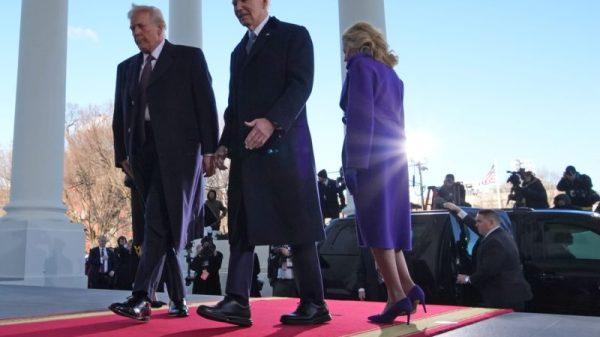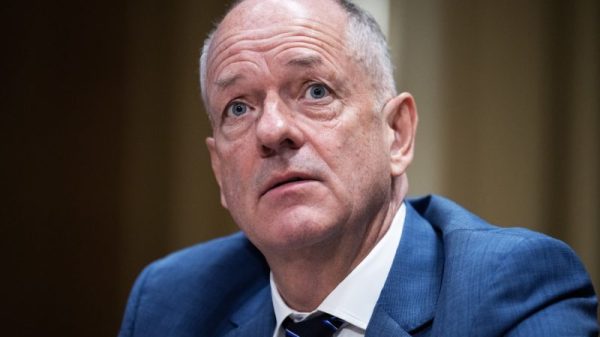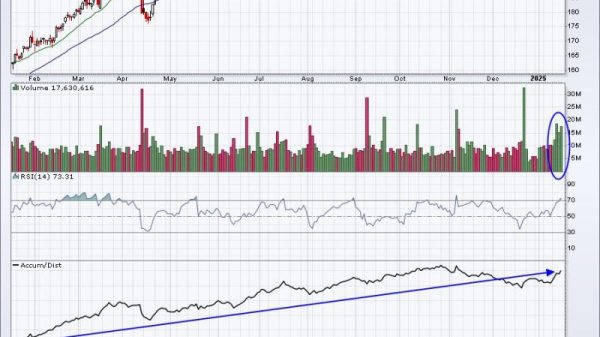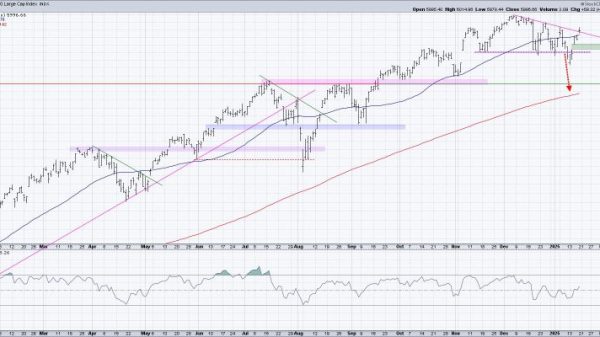The air at the Ukrainian military recruitment office where a 30-year-old hairdresser is being interviewed is filled with anxiety. The man has no military experience and is unsure whether any of his skills would be useful. At one point, the recruiter jokingly suggests that he might be able to give everyone a nice haircut.
Under Ukraine’s new mobilization law, which came into effect on May 18, Ukrainian men are now facing a choice: Comply and face the possibility of being sent to the frontlines, or try to evade and risk penalties and condemnation.
The hairdresser has chosen to pre-empt the choice and volunteered, becoming one of six men to be interviewed at the Da Vinci Wolves Battalion’s recruitment center in Kyiv that day. The office is housed in an ordinary residential building, hidden from the outside world. Inside though, the walls are decorated with photos and big banners showing the logo of the battalion, a drawing of three teeth-baring wolves inside a stylized Ukrainian trident. The unit’s recruitment slogan is “Everyone will fight” and the recruiter’s laptop is covered in stickers, one of them saying “Your pack is waiting for you.”
Ukraine has made no secret of the urgent need to recruit more people as it tries to defend itself against the Russian aggression. While the government doesn’t reveal the number of dead and wounded, estimates made by experts speak of hundreds of thousands of casualties on both sides of the conflict since Russia launched its full-scale invasion in February 2022.
One Ukrainian commander who asked not to be named for security reasons said the personnel shortages are having devastating effects on the battlefield.
Making the case for a new mobilization, Yurii Sodol, the commander of the Joint Forces of Ukraine’s military, told Ukrainian lawmakers last month that Russian troops outnumbered Ukrainian “seven to 10 times” in eastern Ukraine.
This lack of personnel is putting immense pressure on those who are already serving.
“The war is still going on and mobilization is essential. People who have been fighting for two years are tired. Some are going crazy,” said Yaroslav Galas, who is currently serving with the 128th Mountain Assault Brigade.
To make the recruitment process more efficient and more transparent, the new law requires all Ukrainian men between the ages of 18 and 60 to register with the military and always have their documents on them.
However, only men aged 25 to 60 are subject to mobilization under the new law. The lower limit has been slashed by two years from 27 years, but it’s unlikely to make much difference because of Ukraine’s demographic challenges.
High emigration and low birth rates in the 1990s and 2000s mean there are far fewer people currently in their 20s, compared to those in their 30s and 40s.
Women who have medical or pharmaceutical qualifications must also register with the military, although they are not required to serve.
The new rules have been controversial – the draft law was amended more than 4,000 times during the approval process.
‘Desire to fight’
It is unclear how many people will end up being called up. Late last year, the leader of President Volodymyr Zelensky’s Servant of the People faction in parliament said the military was looking for an extra 500,000 servicemen and women. But the Commander-in-Chief of Ukrainian Armed Forces Oleksandr Syrskyi said recently that any increase in numbers would likely be significantly lower.
Some military officers are already questioning whether it will work. Their main worry is that they’ll end up with units full of men who are only there because someone forced them to be.
“We still want people to join voluntarily. Because there is a big difference between someone who was drafted into the army and someone who went to defend their homeland,” said Dmytro Kulibaba, a soldier with the 114th Territorial Defense Brigade.
Galas said that many people are worried that if they get drafted, they will be automatically sent to the frontlines – which he said is not the case.
“If you are a specialist, for example, who in civilian life was engaged in IT, accounting, project management, even cooks, clerks, then the Armed Forces also need you … and you can also make a fairly large contribution to the common victory by joining the Armed Forces,” he said. “We have a separate drone unit who are a little further away from the frontline. People who are good at electronics, even those who like to play computer games, will quickly master this specialty.”
‘Sense of camaraderie’
“I had been preparing for this for about a year or six months. I talked to my friends who are serving, I asked them about everything,” the 35-year-old said, explaining that his goal was to find a unit that would be a good fit for him.
He said agreeing to serve was a clear choice for him – despite some of his loved ones trying to steer him away from it.
“You think about all the options when you must make such a decision. How can I look my son in the eye when I say that I was somewhere (else)? I don’t know, it doesn’t work for me. I made a moral and ethical decision for myself. And then I had to decide with whom I would (feel most comfortable) serving with,” he said.
“It scares people away,” he said. “They don’t know what is happening in the combat brigades and it needs to be explained to them.”
He said that despite the initial worry, many soldiers adapt well to their new life, giving an example of a young IT specialist who was mobilized within the past few months.
“Once he joined this team, he saw that life in an infantry unit is not what civilians imagine. Yes, it is dangerous and difficult. But good people are there, and the bad ones don’t stay. There is a sense of camaraderie. And this is important,” he explained.
The IT man had impressed his commanders immediately, he added.
“He did very well during his first combat mission in Robotyno, holding positions 400 meters away from the Russians. He not only withstood assaults but also took prisoners,” he said.
But not everyone is able to adjust to the realities of life on the frontline. The commanding officer who asked to remain anonymous spoke of another problem with the mobilization, saying that in recent times some recruits have not received the training they need to withstand the pressure.
“The infantry being sent to the frontline needs to be given special training to make them real professionals. Because they come in here, drop their weapons, and run away from their positions,” he said.
“There must be motivation for the current military and those about to serve. We cannot use the methods used in Russia or Belarus – catching and imposing – this will not help. It will only lead to people running away and giving up their positions,” he added.
Running away
“I think I’d be more useful making money and bringing dollars to the country than digging trenches or guarding military facilities,” he added.
He said he believes Ukraine doesn’t have enough weapons to militarily reclaim territory seized by Russia in the war. The only way forward, he said, is a political agreement that would lead to Ukraine regaining its land.
The man said that if he was to receive a draft notice, he would leave the country.
“I don’t want to leave; I know that things are not so beautiful and sunny in Europe. But if I had to choose between going to war or going abroad, I would choose abroad, I would pay a bribe. My life comes first. And I realize that there is a very high chance of being killed,” he said.
The soldiers who are currently serving have little patience for men like this one, who say they can’t join the fight.
“Soldiers who go on leave or for treatment, who are exhausted … of course that (seeing other men) drinking coffee in coffee shops, going to restaurants, pumping their biceps and (saying they were) ‘not born for war’ make soldiers angry,” Galas said.
Unless they obtain a special permit, men between the ages of 18 and 60 have been forbidden from leaving Ukraine since the beginning of the full-scale invasion and last month, the government suspended consular services for men who are not registered with the military.
Some are willing to risk everything trying to escape. The Border Service said that since the start of the full-scale invasion, the bodies of 32 men have been found in the Tysa River on the border with Romania and Hungary.


































